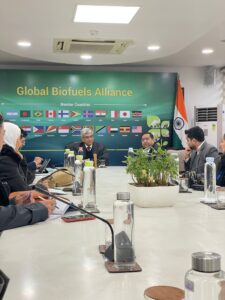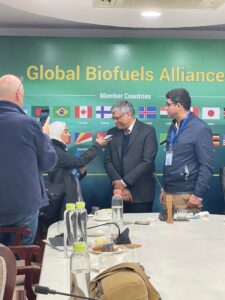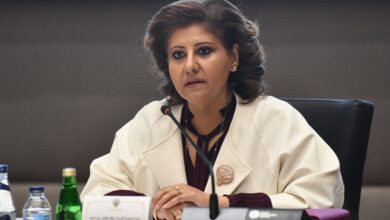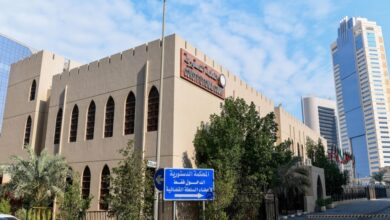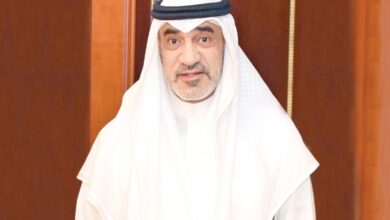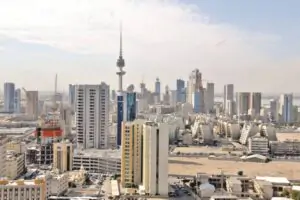
By Abrar Aloqaili
Special Correspondent
The Times Kuwait
With the growth of the global economy slowing, India’s relatively rapid growth is emerging as a clear opportunity for investors looking for bright spots, as major global companies, including those of American and Japanese origin, have bet heavily on India. With a population of about 1.4 billion, India seeks to strengthen its position at the forefront of the world’s largest economies. This year in particular is expected to be pivotal for India, with general elections, one of the largest electoral exercises in the world. scheduled between April and May.
As part of its continuous quest to build bridges with the Gulf region, the Indian Ministry of Foreign Affairs, through the Embassy of India in Kuwait, organized an introductory visit to New Delhi. The Times Kuwait participated from Kuwait, joining a group of about 27 media professionals from Saudi Arabia, Oman, the UAE and Bahrain. During the one-week trip, the group was briefed on the rapid growth of India in the transportation, renewable energy, infrastructure, technology, and other sectors.
Hydrocarbon cooperation with GCC
In an interview with the visiting media delegation, the Secretary of the Indian Ministry of Petroleum and Natural Gas, Pankaj Jain, praised the close relations between India and the Gulf countries that were initiated long before the discovery of oil and gas.
Expanding on India’s energy needs, Jain explained that his country cooperates with Gulf countries on three axes: crude oil, gas and petrochemicals. In response to a question about the possibility of cooperation with Kuwait in the field of oil exploration, refinery products and exchange of experiences, Jain pointed out that Indian refineries produce materials that Kuwait refineries are not producing at the moment, and this cooperation could be beneficial to both countries. He added that the India Energy Forum to be held next February, in which major Gulf and international oil companies plan to participate, will provide more opportunities for cooperation and bilateral relations between the parties to achieve common interests.
He explained that the strength of relations with Gulf countries is reflected in the mutual visits between senior leadership of the two countries, including the recent visit of Prime Minister Narendra Modi to Oman and the UAE, pointing out that five of the Gulf countries are among the most important trading partners with India regarding oil and gas, in addition to other areas such as fertilizers and organic industries.
Pointing out that around 60 percent of the country’s oil and gas originate from the Gulf countries, he added that as the third largest consumer of oil and gas in the world, after China and the United States, India’s hydrocarbon imports were worth about USD119 billion last year.
Jain added that his country’s energy consumption is three times the average consumption of other countries, stressing that despite India’s increasing orientation to clean and renewable energy in various fields, its demand for fossil oil will continue to increase and grow very quickly. Accordingly, energy producers should take these trends into account. He stated that India plans to produce five million tons of green hydrogen by 2030, “as our annual needs are 6 million metric tons.”
He also revealed that India has another source of energy, which is the extraction of methanol from agricultural crops abundantly available in his country, or the use of biogas resulting from the oxidation of foods. He revealed that maritime security challenges witnessed in the region recently affected the cost of shipping transport and caused prices to soar, while increasing the cost of insurance, which negatively affected producers and consumers.
Mumbai Metro 3 Project
The media delegation also met with the Chief Project Manager of the wider Mumbai Metro 3 in the state of Maharashtra, C.M. Jadhav, who explained that the rapid transit metro system was designed to reduce traffic congestion in the city and complement the busy Mumbai suburban railway network.
As India’s financial capital, and one of the most populous cities in the world, Mumbai is a high traffic city. Currently, a 25 kms drive from downtown Cuffe Parade to the airport takes two hours, but once the construction of Mumbai Metro 3 is completed, the trip will take less than 50 minutes. Jadhav explained that each landmark in the Mumbai Metro Line 3 project is another step towards improving the lives of Mumbai residents. Expected to be fully completed in 2025, this will not only save traffic time for residents, but also reduce road traffic in the region by 35 percent, and reduce daily fuel consumption by 460,000 liters.
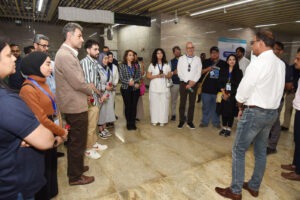
Built in three phases over 15 years, the project is expected to be fully completed in October 2026. Jadhav added that the Mumbai Metro is the sixth longest operating metro network in India with an operating length of 46.4 km. When completed, the platform will consist of 14 high-capacity metro rail lines and one metro line, with a total of 356,972 kilometers (24 percent underground, the rest high, with a small part built on road). The metro will serve 27 stations, and the total financial expenditure to expand the metro system is projected at $14.43 billion.
Jadhav also gave a detailed explanation of the progress of the project and the engineering challenges faced, pointing out that the deepest point in the metro is 23 meters below the surface of the ground, which is air-conditioned and equipped with the latest technology to facilitate entry and exits from the metro.
He stated that the starting point of the metro was in the middle of one of the largest slums in Mumbai, explaining that about 3,000 of these buildings were removed and residents were temporarily transferred to new buildings, pending the construction of residential buildings with apartments for them.
International Solar Alliance
Our next stop was at the headquarters of the International Solar Alliance (ISA) which continues to play a pivotal role in promoting energy security and promoting sustainable livelihoods throughout its member countries. Designed as an alliance of solar-rich countries to meet their own energy needs, the ISA was launched on 30 November 2015, by India and France to implement the Paris Agreement.
So far, about 120 countries have signed the ISA Framework Convention, including 11 EU countries. In a large room containing the flags of the countries participating in the ‘Alliance’, ISA Chief Operating Officer, Joshua Wycliffe made a presentation in which he assured us that the International Solar Alliance continues to play a pivotal role in promoting energy security and sustainable livelihoods throughout its member countries by replacing carbon-intensive fossil fuels with clean and renewable solar energy.
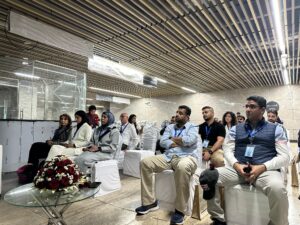
Noting that ISA has so far successfully implemented several initiatives to drive the shift towards a greener future, Wycliff added that ISA aims to deliver clean energy to 200 million Africans by 2030 and that the alliance launched its first pilot project within the framework of the World Economic Forum during COP28 in Dubai.
Pointing to the many real benefits and opportunities that can be realized through optimal investment in solar energy, he noted that it will not only help create more jobs for youth in the private sector in the field of renewable energy, but that it would also open the possibility of enhancing the study and presentation of university disciplines in solar energy, in line with the actual need for the current and future labor market needs of countries involved.
Pointing out that the ISA continues to play a pivotal role in securing renewable energy, and embracing sustainable living in member countries, he noted that there is continuous cooperation among the member countries of the Alliance in order to reach zero neutrality by 2060. He added that as part of its ongoing mission towards replacing fossil fuels with clean and renewable energy sources, and ensuring a safe future, the Alliance has been able to implement several initiatives in various places around the world with the focus on a healthy green future.
Pharmaceutical sector
In a meeting with Sumantha Chowdhury, marketing officer at the Indian Pharmaceutical Export Promotion Council, the media delegation learned that over the past two years there had been a significant increase in the volume of drug exports from India to Kuwait. Ms. Chowdhury explained that pharmaceutical exports to Kuwait increased by 35 percent and 42.7 percent over the past two years. Revealing that further negotiations with the Gulf states on this matter were underway, she said that although negotiations take a long time, they were on the right track.
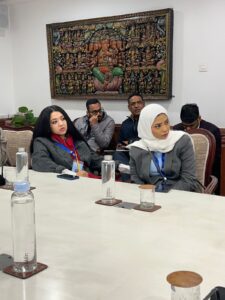
Revealing that India handles around 60 percent of vaccine production globally, Ms. Chowdhury noted that Indian pharmaceutical companies are contributing to raising the level of health worldwide. Adding that the council is responsible for exporting medicines and vaccines to countries around the world, and that any country wanting to import pharmaceuticals from India have to be registered with the council, she revealed that currently around 4,000 companies are registered under the umbrella of the council. .
She pointed out that the pharmaceutical industry in India has a number of advantages, including a strong base of active pharmaceutical ingredients in addition to a high degree of conformity with standards, support from a strong base of pharmaceutical factories, and the availability of researchers, technicians and trained workers.
Business promotion
The media delegation also visited the Federation of Indian Chambers of Commerce and Industry (FICCI), where its Secretary-General Sailesh Pathak called on Kuwaiti businessmen to invest in his country, and engage with their Indian counterparts in making profits, stressing that India offers promising opportunities in several fields.
Stating that Indian investment laws guarantee protection for foreign investors, Pathak pointed out that India is a large country, and investments can be made in any state, especially in the agricultural sector that can contribute to global food security. He added that iInvestments are also being attracted to the information technology, renewable energy, textiles and pharmaceutical sectors.
Pointing to the possibility of doubling investor capital in a short period, he invited Kuwaiti businessmen to come and make profits in India, In his speech to journalists, Pathak touched on the great development that his country has witnessed over the past twenty years in various fields, and its entry into the list of the top twenty countries in the world.
He emphasized that India not only provides investors with the right environment to succeed and reap profits, but the FICCI helps them find a reliable local partner, leaving businessmen wishing to work in his country the freedom to choose the sector they want to invest in.
The Federation has 70 committees that deal with 70 different investment sectors, providing investors with all the information and data they need to help them succeed.
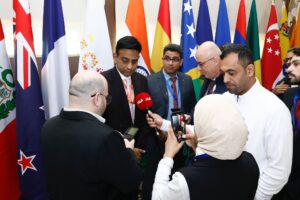
Highlighting the historical achievements that India has witnessed in the field of space and information technology, Pathak stated that these experiences will be available to all our partners in the GCC countries, as close neighbors and having historical relations that date back hundreds of years. Adding that his country attaches great importance to the issue of food security of the Gulf region, and that Indian companies prioritize their relations with the GCC countries, he stressed that the GCC region had no cause to worry about the possibility of India cutting off food or medicine supply due to any economic or other crises.
Cutting edge educational institutions
The Indian Institute of Technology in New Delhi (IIT Delhi) is one of the leading technical institutes in India and the world, with an exceptional reputation in the fields of engineering education and research.
The Institute was founded in 1961, and has ever since played a vital role in the development of outstanding engineering and technological cadres, and its establishment is a major step towards strengthening engineering education in the country.
IIT Delhi offers a wide range of educational programs in different engineering fields, from undergraduate studies to doctoral studies, and the institute allows students to choose from disciplines such as computer engineering, electrical engineering, mechanical engineering, aerospace engineering, and many other disciplines.

The Institute is characterized by advanced research facilities and a huge team of researchers specialized in various fields. The Institute encourages innovative research, and its efforts in this field have resulted in ground-breaking discoveries and engineering developments.
Students enjoy the diversity and activities at Delhi IIT, as the institute provides a varied educational and social environment that promotes cultural and academic interaction. IIT graduates achieve great heights in various fields of industry, business and research, and the extensive alumni network forms a strong support for new students and promotes professional communication.





